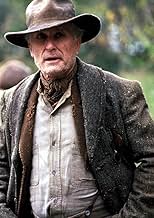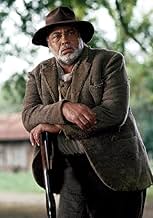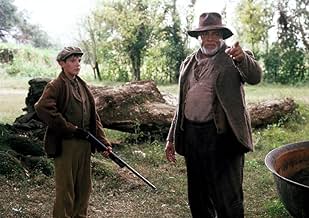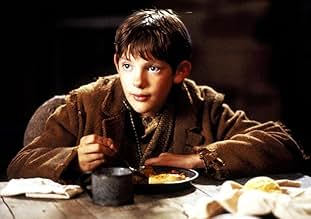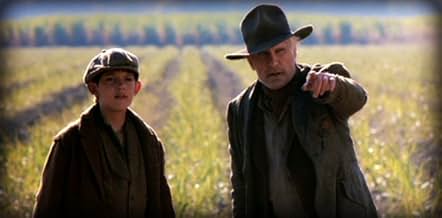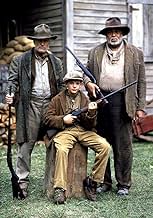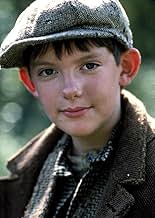Horton Foote's story of a teen-aged boy in the Depression who finds work on an eccentric's sugar plantation and learns life's surprising lessons from the team of convicts who also work there... Read allHorton Foote's story of a teen-aged boy in the Depression who finds work on an eccentric's sugar plantation and learns life's surprising lessons from the team of convicts who also work there.Horton Foote's story of a teen-aged boy in the Depression who finds work on an eccentric's sugar plantation and learns life's surprising lessons from the team of convicts who also work there.
Bob Edmundson
- Overseer
- (as Robert Edmundson)
Featured reviews
If you care for fine acting and excellent characterization, try this film. It doesn't take the commercial, slick, easy approach to the storyline about the reason for use of convict labor on Southern plantations, or about the treatment of the convicts unlucky enough to be doing time at hard labor. Filled with well-thought-out glimpses of the declining southern gentry, the economics of plantation ownership, racism, and other tough subjects, it is also a commentary on human fragility.
Robert Duvall gives a creditable performance as the supervisor of a convict farm in 1902 Texas who befriends a young boy (Lukas Haas). The screenplay, written by Horton Foote, contrasts the difficulties of growing up and growing old. Duvall's character is senile and suffering ill health. He alienates himself from family and associates - except for a former convict assigned to his charge, the young boy who reminds him of his youth, and a couple who live in the village store.
It's a nice set piece, and the warm colors create a real feeling of turn-of-the-century South. While Duvall's character could have been fleshed out more, he does an excellent job as a man intent on dying on his own terms with help from his young charge
It's a nice set piece, and the warm colors create a real feeling of turn-of-the-century South. While Duvall's character could have been fleshed out more, he does an excellent job as a man intent on dying on his own terms with help from his young charge
Robert Duvall is one of America's treasures. He should be given a Lifetime Achievement Award annually at the Academy Award ceremonies, and this film allows him to demonstrate, once again, how it's done. If you agree, by all means run, don't walk, to your nearest video store and rent "Rambling Rose", another of Duvall's gems...which, incidentally, also co-stars Lukas Haas, another underrated and terrific actor, as he shows in "Convicts". Most of Lukas' contribution is in the form of reaction to Duvall's ramblings, but the two of them, along with everyone else in the film, create a marvelous since of realism. Duvall is a mentally addled old drunk who can't remember that he said the same thing to you a few minutes ago, or what you told him, and it's to Duvall's credit that he manages to avoid being boring, as this sort of character so easily could have been. Duvall's character is also disreputable and mistreats the convict labor he has contracted for to work on his farm, but still you empathize with him. Lukas is, as always, wide-eyed (no one had larger eyes, or used them better) and innocent but not stupid. Horton Foote provided realistic dialog and a sure sense of place. This is a film not only to enjoy, but to study.
Like many stage adaptations, this film is a collection of set pieces without a tight overarching narrative. Not only is it adapted from the stage, but from the middle of a three-act play, which serves to remove some of the context; the viewer is just plopped into the middle of this one.
I thought the performances were good overall, but the production was somewhat lacking. Perhaps the streaming version I saw was a bad transfer, but the cinematography was nothing to write home about, the contrast was way too high in many of the daylight scenes, and the colors looked as if the film was shot on old, faded film stock.
A bit of a strange soundtrack too, but I liked it and I thought it was fitting.
I would recommend it if you like Foote, Faulkner, or Duvall.
I thought the performances were good overall, but the production was somewhat lacking. Perhaps the streaming version I saw was a bad transfer, but the cinematography was nothing to write home about, the contrast was way too high in many of the daylight scenes, and the colors looked as if the film was shot on old, faded film stock.
A bit of a strange soundtrack too, but I liked it and I thought it was fitting.
I would recommend it if you like Foote, Faulkner, or Duvall.
Soll (Robert Duval) is a sugar plantation owner in southern Texas, 1902. We catch up with him on the last day of his life when he is not doing so well, having become quite senile. He repeats himself, relives old events, asks the same questions multiple times (getting the same answers). As might be expected, Duval creates a believable character, but I have to admit that spending an hour and a half with Soll served mainly to convince me of how difficult it would be to deal with such a person.
I wasn't there, so I don't know what things were like in southern Texas at the turn of the century, but the atmosphere created in this movie struck me as believable. I had never understood that some of the southern plantations were sugar cane plantations, so that was interesting to see portrayed. At the time of this movie the workers in the field were leased convicts, almost exclusively black. It seems that over three decades after the Civil War the only change in plantation workers was from slaves to leased convicts, who were treated as slaves. Soll did trust one black man (played by James Earl Jones) to help run the plantation. You got the feeling from this film that a certain era was slowly nearing an end from a time when people like Soll proudly wore his Confederate uniform and convicts were treated like slaves to somewhat better times (convict leasing was abolished in Texas in 1910). Soll can be seen as a symbol for a way of life that had grown old and no longer viable.
I was impressed with how Horace, a teenage white boy in the house, was so patient with Sol. The relationship between Soll and Horace was a key element in the movie--as one man was leaving the earth a young man who was more understanding and patient was taking his place. I imagine Horace's experiences on the plantation were something for him to sort through for the rest of his life, particularly the racial issues.
The movie is based on a play and much of it gives evidence to that fact.
I wasn't there, so I don't know what things were like in southern Texas at the turn of the century, but the atmosphere created in this movie struck me as believable. I had never understood that some of the southern plantations were sugar cane plantations, so that was interesting to see portrayed. At the time of this movie the workers in the field were leased convicts, almost exclusively black. It seems that over three decades after the Civil War the only change in plantation workers was from slaves to leased convicts, who were treated as slaves. Soll did trust one black man (played by James Earl Jones) to help run the plantation. You got the feeling from this film that a certain era was slowly nearing an end from a time when people like Soll proudly wore his Confederate uniform and convicts were treated like slaves to somewhat better times (convict leasing was abolished in Texas in 1910). Soll can be seen as a symbol for a way of life that had grown old and no longer viable.
I was impressed with how Horace, a teenage white boy in the house, was so patient with Sol. The relationship between Soll and Horace was a key element in the movie--as one man was leaving the earth a young man who was more understanding and patient was taking his place. I imagine Horace's experiences on the plantation were something for him to sort through for the rest of his life, particularly the racial issues.
The movie is based on a play and much of it gives evidence to that fact.
Did you know
- GoofsWhen Soll thinks he hears someone in the closet he shoots three times and we see three bullet holes. But when Jackson opens the closet door to investigate, there are four holes.
- Quotes
Horace Robedaux: Martha, are you afraid of dying?
Martha Johnson: No, I ain't afraid. Just not ready to go yet.
- SoundtracksGolden Slippers
Sung by Jackson
- How long is Convicts?Powered by Alexa
Details
- Release date
- Country of origin
- Language
- Also known as
- Horton Foote's Convicts
- Filming locations
- Production company
- See more company credits at IMDbPro
Box office
- Gross US & Canada
- $13,623
- Opening weekend US & Canada
- $6,347
- Dec 8, 1991
- Gross worldwide
- $13,623
Contribute to this page
Suggest an edit or add missing content

